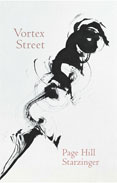
 |
How can we leave each other.
How do we stay together."
Fittingly titled, Starzinger's poetry compilation stunningly captures the elapsing of time through a swirling array of loss and anguish, nostalgia and yearning, and a subtle reconciliation for what cannot be had once lost: time. As the poet probes deeper, her poems become a commentary not only on the speaker's state of being and experiences but also speak to a greater collective vortex of time and memories as they merge to become a fusion of love and regret.
In many ways, the collection is reminiscent of Salvador Dali's iconic surrealist painting, "The Persistence of Memory." While there are many parallels, what stands out most is the depiction of time, particularly its decay. Where Dali's work uses ants crawling upon the melted clocks as a representation of whittling time, Starzinger's mayflies in "My Unborn Child Says to Me" capture the essence of fleeting time with their impossibly short lifespan of a day. Moreover, like much of her poetry, the numerous layers of meaning are on full display. Though the lifespan of a mayfly is just a day, Starzinger juxtaposes the agony of infertility with the mayfly, whose only purpose of existence, ironically, is reproduction.
As someone whose poetry is featured in numerous publications ranging from the American Poetry Review to literary journals like Pleiades, it should come as no surprise that Starzinger is at the peak of her powers when it comes to evoking emotion through her command of poetic language and structure. In particular, the use of strong imagery and metaphor interspersed with a masterful deployment of enjambments for effect make for a thrilling experience that can be enjoyed throughout by layman and aficionado alike.
For instance, in "And: Still," the line, "I am a child of / no one alive, / no one who / can remember / my name" uses a series of enjambment to punctuate the pain upon being orphaned in adulthood and witnessing the gradual demise of her family name and lineage along with the myriad stories of their existence. Later in the same poem, the speaker reflects upon her own infertility journey, stating, "She'd / never be mine. She'd / always belong to another." Heartbreakingly, in this one poem, the entirety of a lifetime of loss is imbued, both in the complete erasure of her past and future lineage, leaving her name to perish with her and time and in the word, "Still," as referenced in the poem's title. Alluding to deeper meanings, Starzinger is incredibly meticulous with her diction and word choice, both in her poetry and in her titles. The word "still" conveys somber feelings of helplessness and an acknowledgment that time will never, in fact, stand still.
Perhaps what makes this compilation so intriguing is Starzinger's fearlessness at tackling a topic laden with such complexities. Numerous poems touch on embracing the breaking down of the human body, but "Specula," in particular, uses alliteration to express a sort of defiance upon learning that the ovaries are no longer functioning as they should, effectively closing the door on a chance at a natural pregnancy: "It is still part of my body / it is alive / it is mine." Despite the defiance, the speaker is not oblivious to the ramifications, understanding that her role contributing to the world's rebirth is short-lived.
In poems like "Age" and "Black Apples," the speaker bares her pain and impending loss, raw and unfiltered, with excruciating questions about her mother in hospice care—questions that undeniably will resonate universally as most have or will go through this phase of loss in the gauntlet of time. A surreal, almost dreamlike quality permeates throughout many of the poems and is once again apparent in "Age," where, while facing her mother's mortality, the speaker speculates on whether she has already become at one with nature: "Is she the voice of the sharp birds, here? / Of the waves on the rocks, there?"
As the poet explores the fleeting inevitability of time, she ruminates on a number of pivotal topics, particularly for the twenty-first century, ranging from wholeheartedly embracing one's body to relishing the present time before it too becomes the past. Overall, the scope and comprehensive nature of Starzinger's poetry is unparalleled, an unquestionable tour-de-force of poetry and philosophy whose impact reverberates far beyond the final poem.
A 2021 Eric Hoffer Book Award Poetry Category Honorable Mention
RECOMMENDED by the US Review